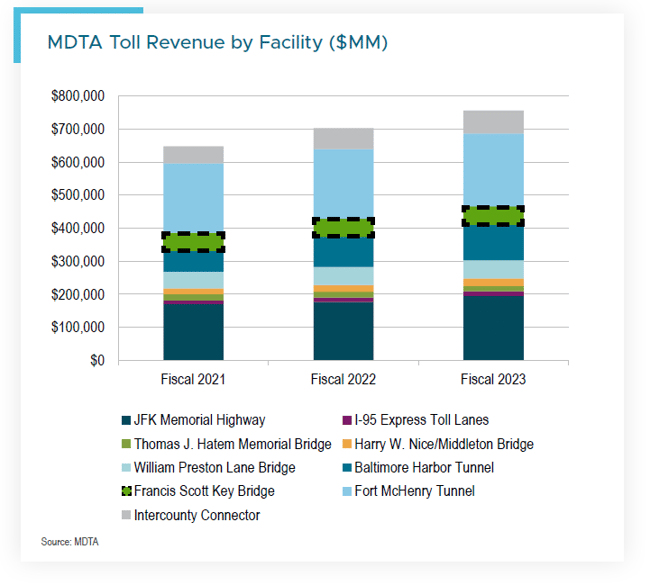Municipal Credit Perspectives
Maryland Bridge Collapse Poses Limited Credit Impact
On March 26, 2024, a container ship collided into the Francis Scott Key (FSK) Bridge in Baltimore causing the structure to collapse into the Patapsco River. The bridge is owned and operated by the Maryland Transportation Authority (MDTA), a state transportation agency whose bonds we hold in our Strategies. Although the accident was devastating, the near-term credit implications for the Authority appear minimal.
The bridge was one of nine revenue-generating assets from which MDTA collects tolls to support its $2.1 billion of outstanding debt and capital improvement program. Based on the most-recently audited fiscal year 2023, FSK collected $56.1 million, or only 7.4% of the Authority’s total toll revenue. And before considering the potential impact of these lost revenues, we expect a portion of lost traffic activity from the bridge to be diverted to other assets owned by the MDTA, particularly the Fort McHenry and Baltimore Harbor tunnels. MDTA’s toll facilities now include three bridges, two tunnels, two managed lane projects and one turnpike as detailed below:

The MDTA’s Transportation Facilities Project bonds (rated Aa2/AA-) are secured by a traditional net revenue pledge, in this instance, toll revenues remaining after the payment of operating expenses. The agency has full autonomy to increase toll rates as needed. Bonds also benefit from a rate covenant that requires toll charges be set at levels sufficient to generate a minimum operating margin, an additional bonds test that dictates coverage requirements before more leverage can be incurred and a debt service reserve solely dedicated to the payment of principal and interest in the event net toll receipts are insufficient.
Based on the most recently audited fiscal year 2023, the Authority’s net revenues provided 4.0x debt service coverage. Excluding FSK Bridge tolls, coverage was lower, but remained healthy at 3.6x of the annual debt payment. Furthermore, at year end, MDTA held ample unrestricted reserves totaling $890 million or the equivalent of 790 days cash on hand. Most transportation agencies maintain robust reserves to cover pay-go repair and maintenance costs and to buffer against economic cycles and unforeseen events.
The longer-term impact of the bridge collapse on the Authority’s credit profile is less certain, as a replacement span will be expensive and take years to complete. Soon after the accident, the Biden administration announced meaningful support for the cleanup and rebuild efforts, starting with an initial award from US Department of Transportation of $60 million for emergency work, to be followed by additional contributions over the life of the project. Other funding will likely come from a mix of state support, insurance proceeds, bond financing, and unrestricted reserves. In the interim, we expect the MDTA’s remaining facilities and its strong cash position to continue to support sound operations.
Within our toll revenue bond holdings, we own 18 separate state agency issuers across 12 states, all but two rated at least A1/A+. These transportation systems garner high-quality ratings due to their essential nature, support from multiple assets, moderate leverage, solid debt coverage, and robust liquidity. Given its history of strong operations and early overtures of significant assistance from the federal government, we expect MDTA will manage the restoration of this vital infrastructure link with minimal impact on its credit profile.
Published April 2024
